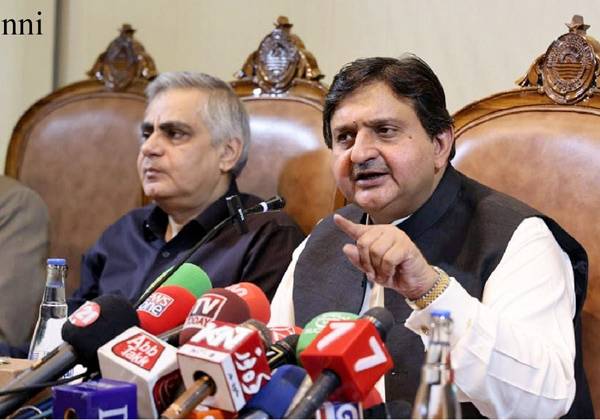LAHORE – Punjab Assembly Speaker Malik Ahmad Khan on Monday defended his constitutional obligation to act on disqualification requests filed under Articles 62 and 63 of the Constitution, while at the same time express-ing strong personal opposition to these controversial clauses.
Addressing a press conference at the Punjab Assembly, the speaker said he was not in favour of expelling any member from the House; however, he was legally bound to decide within 27 days on the requests submitted against 26 opposition lawmakers, or else forward them to the Election Commission of Pakistan.
“It is my constitutional duty to decide on petitions filed against members over alleged oath violations under Articles 62 and 63. The precedent comes from the Supreme Court’s judgment in the Panama case by Jus-tice Asif Saeed Khosa,” he explained. “I am personally the biggest opponent of Articles 62 and 63, and I do not support disqualifying anyone from the Assembly. But if I don’t act, these petitions will automatically be sent to the Chief Election Commissioner in thirty days.”
Ahmad Khan stated that he believes in the supremacy of the Constitution and has always strived to run the Assembly according to the rules and regulations. He emphasized that despite being one of the strongest critics of Articles 62 and 63, it is his constitutional duty to implement them in light of the Supreme Court’s rulings.
The speaker said that the opposition had been given every possible democratic space in the past—from chairing standing committees to leading the Public Accounts Committee—but unfortunately, the opposition turned the Assembly into a forum for constant disruption.
He noted that the opposition is portraying disorder as a political right, but there is no such provision in the Constitution. Parliament is meant for legislation, not protest. If there is disruption during the Order of the Day, proceedings will move forward as per the law.
He further said that the Leader of the Opposition, after consulting constitutional expert Salman Akram Raja, claimed that the Speaker does not have the authority to send a reference. However, the judgment by Jus-tice Asif Saeed Khosa in the Panama Papers case clearly establishes that if members violate their oath, the Speaker must either make a decision or refer the matter to the Election Commission.
Malik Muhammad Ahmad Khan categorically stated that he does not believe in the politics of disqualifying anyone, as practiced by Pakistan Tehreek-e-Insaf. However, if anyone violates constitutional boundaries or undermines the discipline of the House against party decisions, he will not hesitate to take action.
He made it clear that he holds no grudge against any party or leader but is committed to upholding the sanctity of the House. Any member who violates their constitutional oath will inevitably face action.
The speaker further stated that such actions in the past have laid the foundation for undermining democra-cy in Pakistan. “I do not politicize disqualification,” he said, “but if a reference is received under Article 63(2) of the Constitution, it must be decided accordingly.”
The speaker expressed hope that the government and opposition will engage in meaningful dialogue in the coming days to improve the atmosphere of the House, so that the Punjab Assembly can truly serve as the representative forum of the 120 million people of the province. He formally invited the Opposition to sit with him to discuss the issue of disqualification as over two weeks were left to decide on the matter.
The speaker also urged the opposition to abandon disruptive tactics, warning that relying on allegations of victimisation against their leaders to justify protests was counterproductive.
“All political parties in Pakistan have faced tough times at one point or another. The best way to resolve grievances is through dialogue—not by disrupting parliamentary proceedings,” he said. “I would be pleased to see the government and opposition use the Punjab Assembly in the best interests of its 120 million peo-ple.”
